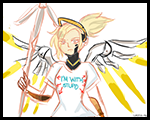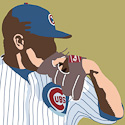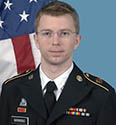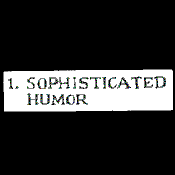|
Introducing the Goons in Platoons Book Club. I intend for this thread to serve two purposes. The first post I will start and update with books, links, and goon-reviews of books about GIP related things. I’d love to pick a book and all read it at the same time so we have something to discuss, but if this serves as simply a request thread, that’s fine too. I have been introduced to a number of good books from random threads in GIP, and I realized in the pictures thread that there’s some parts of history that I don’t know much about, and I don’t want to dive into random books blindly, so I hope this thread can also serve as a, “I want to learn about what it was like to shoe horses in the 1600s” and someone else can recommend the best book about being a farrier in the 1600s. I will attempt to add to this as I get time, and will edit in posts from the thread, but please keep a similar format. Military WWI BlueDiablo posted:As for World War One sort of stuff, I assign my students selections from the following for Western Civ 2: DEVILDOGOOORAH posted:Guns of August. BlueDiablo posted:Seconding Guns of August, when your tactical thinking consists of "Get over there, stab the boche in the gut with your bayonet and save the Republic!" bad poo poo is about to go down. Grandmaison was a shitlord, and that French troops went into battle in 1914 wearing bright loving red pants gives you an idea as to how much the higher-ups were chugging down Napoleonic dick without actually understanding the implications of fast-firing breech loaded artillery or machine guns that can shoot 600 rounds a minute. WWII It Never snows in September: The German View of Market-Garden and the Battle of Arnhem, September 1944. This reads like the Silmarillion (it’s a heavy read, with lots of blandish details), but it’s the best, most comprehensive book on Market-Garden from the German side. It’s hard to find, but if you can, don’t feel bad about skipping over five pages of “regiment X went south two miles, regiment Y went south one point five miles and was commanded to look left...” The Rat posted:Life and Fate by Vasily Grossman is probably the most significant book I've ever read. It's a big ol' Russian epic centering mainly around the battle of Stalingrad. The author was a war journalist for the Red Army who was at Stalingrad and one of the first death camps taken over, so it's all very real and vivid. mackensie posted:The Third Reich At War by Richard J Evans. Vietnam Low Level Hell. I have read every book that I can when it comes to Vietnam FAC or helicopter aviation and this is one of the best rotary books out there. The author was both a scout pilot (aka: fly along, get shot at, call in the gunships) and a gunship pilot so you get a good perspective from both sides. To The Limit: An Air Cav Huey Pilot in Vietnam. At one point in this book the pilot is hovering over a body of water doing search and rescue, he can’t see, so he has a crew chief sit on each skid with their boots off, and when their feet touch the water they tell him he’s too low. He does this for several hours looking for a crashed helo. If that doesn’t get you to read this book, nothing will. Chickenhawk. This was one of the first books written by a helicopter pilot in Vietnam. It’s also very honest, he doesn’t pull punches when he talks about being afraid, or not wanting to kill, whereas some books get kind of gung-ho all the time. Very well written, but maybe not as “action packed” as To The Limit (but no less a good book) Booblord Zagats posted:J.M. Moriarty's Ground Attack Vietnam iyaayas01 posted:One Day Too Long. As part of the secret war in Laos, the US government established a radar facility on a mountaintop in far northeastern Laos to control jets bombing North Vietnam, allowing them to bomb effectively in inclement weather. They staffed the site with USAF personnel who were sheep-dipped (temporarily removed from military service and working as Lockheed "contractors.") The North Vietnamese quickly recognized the significance of the facility and began preparations to attack it (including an aerial assault by An-2 biplanes where an Air America Huey got an air to air kill by firing an AK out the door at one of the An-2s). Despite growing indications that an attack was imminent, and the fact that the vast majority of the attacks Heavy Green (code name of the operation) was directing were in defense of Site 85 (kind of a self licking ice cream cone) the US Ambassador in Laos and 7th AF refused to pull out the site. NVA sappers scaled the cliffs where the site was situated and launched a devastating attack, killing 11 of the 17 USAF personnel at the site. Another (Chief Richard Etchberger) was killed during the evacuation the following morning (he was nominated for the Medal of Honor for his actions in defending his men, but this was denied and he was posthumously awarded the Air Force Cross in a secret ceremony...this was finally upgraded to a Medal of Honor in 2010). BlueDiablo posted:A Lonely Kind of War http://www.amazon.com/Lonely-Kind-War-Forward-Controller/dp/0891416382 I just finished reading A Lonely Kind of War, actually, and it’s really good. At one point they land on a random-rear end path with their planes to pickup an LRRP team under fire, it’s pretty crazy. Cold War Gunktacular posted:http://www.amazon.com/Khrushchev-Remembers-Edward-Crankshaw/dp/B000HZVK0W/ref=pd_sim_sbs_b_1 Can-O-Raid posted:
ded posted:Do you want a real look at how subs operate? Stalking the Red Bear is a book written by an ex-CO of a 637 class boat. It is about as close as you will ever get without actually serving on a boat to knowing how things are. It is not the best book ever written but it is still a good read. Modern Black Hawk Down: A Story of Modern War. Mark Bowden is a master of this kind of journalistic historical writing. He brings perspectives on both sides together and gives a complete and detailed rundown of the events of the Battle of Mogadishu. WP CURES PALESTINE posted:Generation Kill If you can only read one account of the Iraq War, this should be it. Wright spent about a month with a squad of recon Marines -- essentially the special forces of the corps -- and his account is nothing short of gripping. rockamiclikeavandal posted:Blood Makes the Grass Grow Green by Johnny Rico is the best book about deployed life with no action. The first book I have ever seen that isn't some hooah bullshit or some dark anti war piece. This is just life in the slow lane dealing with dickheads. This guy ain't a hero, he's just some schlub trying to meddle through. Shows what 90% of anyone's time in the military is really like. WP CURES PALESTINE posted:Generation KillIf you can only read one account of the Iraq War, this should be it. Wright spent about a month with a squad of recon Marines -- essentially the special forces of the corps -- and his account is nothing short of gripping. Can-O-Raid posted:'Afghan Guerrilla Warfare' Gives accounts of Mujaheddin tactics during the Soviet adventure in Afghanistan, including firsthand interviews from the Muj themselves. Hovermoose posted:Outlaw Platoon: Heroes, Renegades, Infidels, and the Brotherhood of War in Afghanistan by Sean Parnell. In my opinion one of the best books to have come out of the war in Afghanistan. Parnell is a fairly gifted writer and he tells his story honestly and in an easy to read way. Nothing ground shattering, but absolutely worth picking up. Civilian The Grey Seas Under: The Perilous Rescue Mission of a North Atlantic Salvage Tug - Is probably one of the best books I have ever read. The hardships these guys on this salvage tug went through just to rescue other ships reads like fiction but it happened. From laying in the steering gear space and holding their breath every time the transom went under water in huge seas, to shimmying across a tow line to a stricken vessel...these guys had huge balls. The Serpent's Coil. Read if you can't get enough of The Grey Seas Under. This book focuses on the sister ship to the book from TGSU, and one harrowing search, rescovery, and rescue. Thanks Sharkytm Riding Rockets. This is a book about being an astronaut. It's not a hoorah USA USA history book, it's a down to earth story about what it takes, and how sex works on the Space Shuttle. It's nice to see the veil stripped away and see that deep down, even the guy who flies the shuttle makes a fart joke here and there. Thanks Sharkytm PLANES CURE TOWERS posted:I read Riding Rockets a whileback. It was a good read, the only problem I had with it was having to sit through him bitching about Sally Ride, and bitching about John Glenn flying in 1998. Otherwise it was a good time reading about space boners. Requests elendil004-I would like a book about the Falklands War, in black hawk down style, so I can get perspectives from both sides. If there isn’t a book like that, then something comprehensive. I wanna read about the events surrounding it, but I don’t want to have to read a dozen books if I can help it. Christoff- would like a book about why we hate the communists so much. He said a book that explains “Just why we're supposed to hate it so much as Americans” Elendil004 fucked around with this message at 17:43 on May 23, 2013 |
|
|
|

|
| # ? Apr 30, 2024 08:41 |
|
Since he's too lazy to do it himself, I'll add: Riding rockets. I borrowed it from ^^^, and it was a great expose on the highs and lows that astronauts go through for the space shuttle. Also, related to Gray seas under is: The Serpents Coil. Same company, but focusing on a single search, recovery, and rescue.
|
|
|
|
Life and Fate by Vasily Grossman is probably the most significant book I've ever read. It's a big ol' Russian epic centering mainly around the battle of Stalingrad. The author was a war journalist for the Red Army who was at Stalingrad and one of the first death camps taken over, so it's all very real and vivid.
|
|
|
|
Blood Makes the Grass Grow Green by Johnny Rico is the best book about deployed life with no action. The first book I have ever seen that isn't some hooah bullshit or some dark anti war piece. This is just life in the slow lane dealing with dickheads. This guy ain't a hero, he's just some schlub trying to meddle through. Shows what 90% of anyone's time in the military is really like. But don't take my word for it:one star review posted:Couldn't finish it. Having served multiple combat tours, and been a member of the military, this book is an insult to those who serve! I could go on for hours but this turd does not deserve it. one star review posted:Before I joined several years back I was reading anything and everything military I could get my hands on. A sort of preview of what I was getting into. After reading this book and spending some time in the military, I can now really write this review.
|
|
|
|
Everything about boats by Michael Tougias. The finest hours Ten hours till dawn Overboard A storm too soon Fatal forecast I'm probably missing one. Mike does an incredible amount of research for each book, interviewing participants, and digging through archives. His books are awesome.
|
|
|
|
When I read military history, I read almost exclusively World War 2, with a primary focus on the European campaign from the US or German perspective. Here are some of my essential books: The Third Reich At War by Richard J Evans. For an excellent overview of the war in Germany, check out Richard J Evans excellent trilogy. The third and final volume, The Third Reich At War, takes the reader on a journey from the height of the Reich's power to its utter and complete defeat and devastation. From the Amazon overview: Amazon posted:Describing the Third Reich from the height of its power to its collapse, Evans concludes the masterful trilogy that began with The Coming of the Third Reich and The Third Reich in Power. As in those works, Evans demonstrates a fluent style and a sweeping grasp of the Third Reich's history and of the enormous historical literature. The account is peppered with insightful anecdotes drawn from diaries, letters and speeches. What comes across most clearly is the supreme arrogance of the Nazis and the utterly rapacious character of their rule. Evans gives the Holocaust the centrality it deserves, while also depicting effectively the suffering of Poles and many others under Nazi domination. Evans offers a nuanced picture of the lives of Germans, but ultimately, he suggests, the Nazis' racial ideology thoroughly corrupted German society. Evans narrates the Reich's end in gripping fashion as the Allies closed in on Germany. Seven Days in January by Wolf T. Zoeph On the opposite end of the spectrum, Seven Days in January, is probably one of the finest discussion of one unit's actions first against the Soviets in Finland and then the Americans in France. The book is replete with dozens of maps carefully detailing the attacks and retreat from Wingen-sur-Moder in the Lower Vosges. Leave your preconceptions of the Waffen-SS and, for that matter, the untried American divisions. From the Amazon overview: Amazon posted:Wolf Zoepf has produced an extremely detailed account, part-memoir, part-combat narrative, covering the actions of 6th SS Mountain Division 'Nord' during the battles fought in Operation Nordwind, Alsace, 1945. Against the background of his division's three (plus) years of combat against the Soviets in northern Karelia, this book provides a detailed description of 6th SS Division's actions against elements of the US Seventh Army in the Low Vosges Mountains during the first seven days of 1945. Beyond a simple account of the course of the infiltration, raid, defence and exfiltration by his two-battalion task force, Herr Zoepf's book thoroughly recounts the action in adjacent sectors within the Low Vosges, on the German and the American sides of the battle as well. Particular attention is given to the battle for Wingen-sur-Moder, involving both seasoned and green American forces, and German units ranging from hastily-trained Volksgrenadiers to previously undefeated SS-Gebirgsjager. The course of the battle includes a masterfully-conducted infiltration through snow-covered mountains, the capture - and subsequent release, unharmed - of over 250 Americans, considerable close combat, jointly conducted Waffen-SS and American medical care for their wounded, and, ultimately, the wounding and capture of the author. Ringing with authenticity and full of fresh insights and factual data about this practically-unknown battle and oft-overlooked elite unit, Seven Days in January will make an important and unique contribution to the body of literature of World War II in Europe. With the Old Breed: At Peleliu and Okinawa by E. B. Sledge Easily one of the best, if not the best, first-person narratives to come out of the war. From the Amazon overview: Amazon posted:An Alabama boy steeped in American history and enamored of such heroes as George Washington and Daniel Boone, Eugene B. Sledge became part of the war’s famous 1st Marine Division—3rd Battalion, 5th Marines. Even after intense training, he was shocked to be thrown into the battle of Peleliu, where “the world was a nightmare of flashes, explosions, and snapping bullets.” By the time Sledge hit the hell of Okinawa, he was a combat vet, still filled with fear but no longer with panic. Wartime: Understanding and Behavior in the Second World War by Paul Fussell Savage takeout of the glorification of war and gung-ho thinking by the author of a classic WW1 book, The Great War and Modern Memory, this book is a must read on the effects of war on the frontline soldier. I've always had the feeling that a ex-soldier's war nostalgia is directly inverse of how close he was to actual combat. From the Amazon overview: Amazon posted:Most of the men who fought World War II were young--with those over 27 or 28 likely to be called "Dad." For most of the troops, the war's purpose seemed remote and vague, according to Fussell. He contends that many Americans had little comprehension of Nazism; to "our boys" the war was about revenge against the Japanese. In this sequel to The Great War and Modern Memory , Fussell presents American and British soldiers as alcoholically insulated against reality, suffering boredom, absurdity, sexual deprivation and, above all, full of subversive contempt stoked by the official mix of optimism and euphemism that falsified the war experience. Separate chapters cover wartime rumors and blunders, service slang, the despair in the trenches, and the sanitized, sanguine messages emanating from radios, films, songs and high-minded literature back home. This brilliant, engaging cultural history quietly subverts our whitewashed collective memory of the war. Operation Drumbeat by Michael Gannon There are tons of excellent books on the Battle of the Atlantic. Operation Drumbeat, or Operation Paukenschlag, was called many things - the American shooting season, the second Happy Time - but the trivial names belie a battle that nearly took the US out of the war in the North Atlantic. From Jan. 1942 to Aug. 1942, Axis submarines sank 609 ships totaling 3.1 million tons for the loss of only 22 U-boats. This was roughly one quarter of all shipping sunk by U-boats during the entire Second World War. During this time, one U-boat sailed past Coney and the entrance to NY harbor (and by some accounts, sailed right into the harbor. And during this time, Americans did not heed the call for blackouts. Ships would be silhouetted against the city lights and were easy targets. Diners in Florida watched as tankers blew up just off the coast. Here's what it looked like:  Victory Was Beyond Their Grasp: With the 272nd Volks-Grenadier Division from the Huertgen Forest to the Heart of the Reich by Douglas E. Nash Finally, an account of Germany near and at the end of the war. An excellent narrative of one of the Volks-Grenadier divisions which are often confused with the rag-tag Volksturms which were filled with boys and old men - cannon fodder. The VGD's were elite units loyal to the National Socialist cause. This book, like It Never Snows in September, is German view that is a much easier (and I think more comprehensive) read. From the Amazon overview: Amazon posted:As the Allies arrived at the frontiers of Germany itself in the last autumn of WWII, the Germans responded with a variety of initiatives designed to regain the strategic initiative. While the Wonder Weapons such as the V-2 missile are widely recognized, the Volks-Grenadier Divisions (VGDs) are practically unknown. Often confused with the Volkssturm, the Home Guard militia, VGDs have suffered the undeserved reputation as second-rate formations, filled with young boys and old men suited to serve only as cannon fodder. This ground-breaking book shows that VGDs were actually conceived as a new, elite corps loyal to the National Socialist Party and equipped with the finest weapons available. Come follow along with the soldiers of the 272nd VGD's Fusilier Company from their first battles in the Huertgen Forest to their final defeat in the Harz Mountains . . . learn the enormous potential of VGDs . . . and feel their soldiers' heartbreak at their failure. Okay there you go. Dresden is another interest of mine, but, I'll save them for another day, except to say Slaughterhouse 5 by Kurt Vonnegut is probably one of the important books about the effects of war on man ever written.
|
|
|
|
J.M. Moriarty's Ground Attack Vietnam One of the best books out of Vietnam. Moriarty is realistic about what his job was and has some amazingly intense stories about flying the OV-10 in Vietnam and even a good story about making an rear end out of the Great Santini himself. Dude doesn't see himself as a badass, just a competent pilot who understood the gravity of the situation without letting it define his personality. http://www.amazon.com/exec/obidos/ASIN/0804110654/ov10broncoassoci
|
|
|
|
Catch 22 teaches you everything you need to know imo Also don't normally read submarine books but blind mans bluff is great !!!!
|
|
|
|
mokhtar belmokhtar posted:Catch 22 teaches you everything you need to know imo
|
|
|
|
My War by Colby Buzzell is a pretty dang good book. Here's the Amazon synopsis: "Colby Buzzell traded a dead-end future for the army-and ended up a machine gunner in Iraq. To make sense of the bloody insanity surrounding him, he started a blog about the war and how it differed from the government's official version. As his blog's popularity grew, Buzzell became the embedded reporter the Army couldn't control-despite its often comical efforts to do so."
|
|
|
|
I know I contributed a fair amount to the last thread, but I'm feeling lazy right now so here's just one off the top of my head because I'm giving my copy to a friend of mine that will probably be going over to SEA on a JPAC trip later this year: One Day Too Long. As part of the secret war in Laos, the US government established a radar facility on a mountaintop in far northeastern Laos to control jets bombing North Vietnam, allowing them to bomb effectively in inclement weather. They staffed the site with USAF personnel who were sheep-dipped (temporarily removed from military service and working as Lockheed "contractors.") The North Vietnamese quickly recognized the significance of the facility and began preparations to attack it (including an aerial assault by An-2 biplanes where an Air America Huey got an air to air kill by firing an AK out the door at one of the An-2s). Despite growing indications that an attack was imminent, and the fact that the vast majority of the attacks Heavy Green (code name of the operation) was directing were in defense of Site 85 (kind of a self licking ice cream cone) the US Ambassador in Laos and 7th AF refused to pull out the site. NVA sappers scaled the cliffs where the site was situated and launched a devastating attack, killing 11 of the 17 USAF personnel at the site. Another (Chief Richard Etchberger) was killed during the evacuation the following morning (he was nominated for the Medal of Honor for his actions in defending his men, but this was denied and he was posthumously awarded the Air Force Cross in a secret ceremony...this was finally upgraded to a Medal of Honor in 2010). The US government then proceeded to engage in an over a decade long coverup of the incident, both the operation itself as well as the poor decision making that had led to the single largest ground combat loss of USAF personnel in Southeast Asia. USAF personnel as well as govt lawyers repeatedly and knowingly lied, in court and under oath, regarding the events of the day and what was known about the status of the men who were presumed dead. In short the government treated the surviving families like poo poo. The author also has gone to Laos on some JPAC missions, including a couple to Site 85, and the book goes into that in some depth as well. It is a very well written, very readable, but very scholarly book (it's got 75 pages of footnotes). Everyone should read this book. Okay I lied, here's a few more. The author of One Day Too Long also wrote an excellent book that is more of an overview of the US secret war in Laos, At War in the Shadow of Vietnam. If you are interested in the secret war, this is probably the book I would recommend as an initial primer...it is quite readable but like One Day Too Long is also very scholarly, with extensive footnotes. Here There Are Tigers is the memoir of a guy who spent a tour flying O-2s on Nail FAC missions over Laos, it's pretty good. Air Commando One is the biography of Heinie Aderholt, the guy who is basically the father of AFSOC. He flew covert missions during Korea, helped the CIA support Tibetan guerrillas in the late '50s and early '60s, assisted in drawing up the air support plans for the Bay of Pigs, was one of the first US dudes on the ground in Laos and helped set up the Lima sites, stood up the 56th Air Commando Wing at Nakhon Phanom, and finally in 1975 when he was commanding JUSMAGTHAI, basically singlehandedly organized the airlift that got 2,000 Hmong out of Long Tieng before it fell to the Pathet Lao. Dude was a badass. Also Ed Rasimus's (RIP) books are a couple of the finest aviation memoirs ever written. When Thunder Rolled is about his tour flying Thuds during Rolling Thunder, and Palace Cobra is about his tour flying Phantoms during Linebacker. He also helped author Fighter Pilot, Robin Olds's memoirs, which are very good. Sailors Till the End is a very readable account of the Forrestal fire: https://www.youtube.com/watch?v=chuiyXQKw3I Finally, going back a few years, Bernard Fall's books are basically required reading on the French experience in Indochina...Street Without Joy is THE definitive history of the First Indochina War, while Hell in a Very Small Place holds the same title for Dien Bien Phu. iyaayas01 fucked around with this message at 06:11 on May 16, 2013 |
|
|
|
Do you want a real look at how subs operate? Stalking the Red Bear is a book written by an ex-CO of a 637 class boat. It is about as close as you will ever get without actually serving on a boat to knowing how things are.Amazon posted:
It is not the best book ever written but it is still a good read.
|
|
|
|
Dude, Where's my War? A gently caress-up and his dumbass friends join the army unwittingly after stumbling into a recruiting office after a prom night filled with hijinks and attempt to figure out which war they've been fighting for 10 years straight. Plenty of hand-raising, question-asking, and hair-raising accounts of some guy licking dirt both on purpose and accidentally, but mostly accidentally, but he also licks some buttholes and pees on a few guys, both on purpose and accidentally. Written through the point of view of several characters who, both on purpose and accidentally, stumble their way up higher and higher through the ranks like an old man falling down an upwards-moving escalator until they're in charge of several divisions through groundhog day style longevity. Do they find out which war they're fighting? Read to find out. Good writing style, good accuracy. Don't be afraid to skip through some of the enlisted-exaggerated details of their work days while in garrison and skip to right when they're still trying to figure out who's shooting at them and from wherem. (USER WAS PUT ON PROBATION FOR THIS POST)
|
|
|
|
Generation KillIf you can only read one account of the Iraq War, this should be it. Wright spent about a month with a squad of recon Marines -- essentially the special forces of the corps -- and his account is nothing short of gripping.
|
|
|
|
So are people interested in picking a book for us all to read through in June so we can talk about it? We can pick one nobody's read, or we've all read, or who knows I'm open to suggestions.
Elendil004 fucked around with this message at 17:09 on May 16, 2013 |
|
|
|
What about Maddow's book Drift: The Unmooring of American Military Power? I've been meaning to read it, and heard nothing but good review or hate among those who hate her.
|
|
|
anne frank fanfic posted:Dude, Where's my War? A gently caress-up and his dumbass friends join the army unwittingly after stumbling into a recruiting office after a prom night filled with hijinks and attempt to figure out which war they've been fighting for 10 years straight. Plenty of hand-raising, question-asking, and hair-raising accounts of some guy licking dirt both on purpose and accidentally, but mostly accidentally, but he also licks some buttholes and pees on a few guys, both on purpose and accidentally. Written through the point of view of several characters who, both on purpose and accidentally, stumble their way up higher and higher through the ranks like an old man falling down an upwards-moving escalator until they're in charge of several divisions through groundhog day style longevity. Do they find out which war they're fighting? Read to find out. Good writing style, good accuracy. Don't be afraid to skip through some of the enlisted-exaggerated details of their work days while in garrison and skip to right when they're still trying to figure out who's shooting at them and from wherem. Contemporary Catch-22
|
|
|
|
|
Asked in the mil pics thread but it just turned into a discussion. Request: book about why we hate those god drat communist so much
|
|
|
|
Christoff posted:Asked in the mil pics thread but it just turned into a discussion. Do you want like, why we started to be at adds with the USSR? Or why communism in general is "bad"? Like, do you want history or theory?
|
|
|
|
Elendil004 posted:So are people interested in picking a book for us all to read through in June so we can talk about it? We can pick one nobody's read, or we've all read, or who knows I'm open to suggestions. It might be a good idea to start with a book a lot of us have read so we can develop some sort of standard for discussion.
|
|
|
|
Starship Troopers? :pElendil004 posted:Do you want like, why we started to be at adds with the USSR? Or why communism in general is "bad"? Like, do you want history or theory? Just why we're supposed to hate it so much as Americans
|
|
|
|
Christoff posted:Asked in the mil pics thread but it just turned into a discussion. Here you go: http://www.amazon.com/Khrushchev-Remembers-Edward-Crankshaw/dp/B000HZVK0W/ref=pd_sim_sbs_b_1 A view from the inside of Stalin's inner circle. Its an amazing read if a bit slow at parts since its a memoir. Amazon review for you: Khrushchev narrates about his rise in the communist party in the Soviet Union from the Bolshevik revolution in 1917 to challenge the U.S. in possible nuclear war and what a story it is. A man who is a born survivor and who survived several purges against undoubtably one of the most sinister, conniving, deceitful and murderous dictators of all time - Joseph Stalin. Written while he was in political exile in the 1960's and apparently as a way to get back at the Soviet Union for the shabby way he was forced to resign by Breznev. This is the soviet leader who replaced Stalin after he died in 1953 and who appears to have ended much of the massive killing by way of the Gulags. He is also the man who spoke against Stalin after his death and showed the Soviet people what monstrous crimes and recklessness that brought Russia into war with Germany from 1941 - 1945 by way of the Molotov-Ribbontrop alliance agreement which dismembered Poland in Sept of 1939 and which started the world war in Europe. Khrushchev is also the Soviet leader who gave permission to publish the first book by Alexander Solzhenitsyn with his One Day in the Life of Denisovich which provided the world the first glimpse of the horrors of the terrible Gulag system which destroyed million of lives. A fervent atheist and committed Marxist-Leninist who was totally dedicated to the Soviet state he nevertheless could be a charming and persuasive individual. He admits that the propertied classes of the Soviet Union should be eliminated (liquidated) and is one chapter reproaches Stalin for allowing the food shortages in the Ukraine in 1947 be so terrible that parents in famine condition eat their own children to which Stalin merly shugs his shoulders and walks off. Stalin doesn't care one whit about human life of his citizens after all there is no God and since there is no God there cannot be a soul so why should this matter. Much Soviet history is in this book which will interest specialist students of this era especially events in World War II. It is also a story of one person's political survival under immense stress and arbitrary death sentences. Stalin's ways were unpredictable and capricious. Probably this because what Stalin wanted: complete fear for the people so they would become passive like sheep unable to strike back at him. Kruschev mentions that when you met Stalin for a meeting you didn't know whether you would come out alive. He explains the unpredictable paranoia of Stalin and his methods for destroying imagined and real rivals such as Trotsky and other communist party leaders.
|
|
|
|
rockamiclikeavandal posted:Blood Makes the Grass Grow Green by Johnny Rico is the best book about deployed life with no action. The first book I have ever seen that isn't some hooah bullshit or some dark anti war piece. This is just life in the slow lane dealing with dickheads. This guy ain't a hero, he's just some schlub trying to meddle through. Shows what 90% of anyone's time in the military is really like. But don't take my word for it: The only book I like more than this book is http://www.amazon.com/Blood-Risers-...d+on+the+risers But seriously this Johnny Rico dude is awesome.
|
|
|
|
Gunktacular posted:Here you go:  In that vein, Archie Brown's Rise and Fall of Communism gives a history of the whole movement. It's a long, book, and skims over some pretty big patches of history, but covers everything from the First International to the present day in China.  'Afghan Guerrilla Warfare' Gives accounts of Mujaheddin tactics during the Soviet adventure in Afghanistan, including firsthand interviews from the Muj themselves. anne frank fanfic posted:Dude, Where's my War? A gently caress-up and his dumbass friends join the army unwittingly after stumbling into a recruiting office after a prom night filled with hijinks and attempt to figure out which war they've been fighting for 10 years straight. Plenty of hand-raising, question-asking, and hair-raising accounts of some guy licking dirt both on purpose and accidentally, but mostly accidentally, but he also licks some buttholes and pees on a few guys, both on purpose and accidentally. Written through the point of view of several characters who, both on purpose and accidentally, stumble their way up higher and higher through the ranks like an old man falling down an upwards-moving escalator until they're in charge of several divisions through groundhog day style longevity. Do they find out which war they're fighting? Read to find out. Good writing style, good accuracy. Don't be afraid to skip through some of the enlisted-exaggerated details of their work days while in garrison and skip to right when they're still trying to figure out who's shooting at them and from wherem. Bring back BYOBEEEEEE
|
|
|
|
http://www.amazon.com/The-Great-Game-Struggle-Kodansha/dp/1568360223 Good back story to Afghanistan anne frank fanfic posted:Dude, Where's my War? A gently caress-up and his dumbass friends join the army unwittingly after stumbling into a recruiting office after a prom night filled with hijinks and attempt to figure out which war they've been fighting for 10 years straight. Plenty of hand-raising, question-asking, and hair-raising accounts of some guy licking dirt both on purpose and accidentally, but mostly accidentally, but he also licks some buttholes and pees on a few guys, both on purpose and accidentally. Written through the point of view of several characters who, both on purpose and accidentally, stumble their way up higher and higher through the ranks like an old man falling down an upwards-moving escalator until they're in charge of several divisions through groundhog day style longevity. Do they find out which war they're fighting? Read to find out. Good writing style, good accuracy. Don't be afraid to skip through some of the enlisted-exaggerated details of their work days while in garrison and skip to right when they're still trying to figure out who's shooting at them and from wherem. No jokes in the grey forums.
|
|
|
|
|
I'm civvy scum, but I'm fairly surprised you guys didn't mention A Lonely Kind of War http://www.amazon.com/Lonely-Kind-War-Forward-Controller/dp/0891416382 It's told by one of those guys who flew ultra-light air craft in Vietnam acting as a forward controller, you get a good amount of the nitty-gritty of how air/artillery support worked. I was surprised at how complicated it was, as I was often under the assumption it was "find bad guy, press button, kill bad guy" or something to that effect. As for World War One sort of stuff, I assign my students selections from the following for Western Civ 2: Storm of Steel by Ernst Junger http://www.amazon.com/Storm-Steel-Penguin-Modern-Classics/dp/0141186917/ref=sr_1_2?s=books&ie=UTF8&qid=1368764621&sr=1-2 Think of this guy as the anti-All Quiet on the Western Front. Rather than your typical "oh god, war is terrible" stuff that came out of that generation, Ernst Junger fully embraced it, and has been variously described as psychotically brave, a pseudo-fascist, and at the same time an anti-nazi that Hitler couldn't just get rid of because he had too much street cred with the Prussian officer corps. It's written largely from an edited diary, just as a heads up. And for the other end of the spectrum, Under Fire by Henri Barbusse http://www.amazon.com/Under-Penguin...er+fire+penguin This is an at-times other-worldly novel, perhaps one of the first "soldiers' stories" published during WWI (I think it came out in 1917) by veteran Henri Barbusse. Much like Junger, he joined up in August 1914 with the whole "shower of roses and blood" atmosphere, but instead is utterly horrified by the war, especially the effects of industrialized warfare on human beings. He becomes a die-hard communist after the war, and actually dies in Moscow in... 1933 I think writing a biography on Stalin, but his writing gives you an idea of the overwhelming nature of industrialized warfare on a level that had never before been seen.
|
|
|
|
Geneva Convention - This is the illustrated edition, since you probably don't read so good. Universal Declaration of Human Rights The Face of Imperialism Lucky Star, Vol. 1 (USER WAS PUT ON PROBATION FOR THIS POST)
|
|
|
|
Rotten Punk posted:Geneva Convention - This is the illustrated edition, since you probably don't read so good. lmao in all seriousness, my freshman intro to political science prof at cal said these were great so i'll definitely check them out also they were all checked out at the zucotti people's library 
mokhtar belmokhtar fucked around with this message at 06:09 on May 17, 2013 |
|
|
|
No WWI and Guns of August? for shame. It's a great book that spells out a lot of the retarded thinking being done by various european armies of the day. Doesn't touch upon the US much if at all due to it only being maybe the first year of war, but still great if you can stand it not being americacentric
|
|
|
|
Seconding Guns of August, when your tactical thinking consists of "Get over there, stab the boche in the gut with your bayonet and save the Republic!" bad poo poo is about to go down. Grandmaison was a shitlord, and that French troops went into battle in 1914 wearing bright loving red pants gives you an idea as to how much the higher-ups were chugging down Napoleonic dick without actually understanding the implications of fast-firing breech loaded artillery or machine guns that can shoot 600 rounds a minute. One of my favorite bits to make that last part clear to students to to lay two cartridges down on a table and say "this is the average rate of fire per minute for a member of the British Army in 1814", then I put down a box of fifteen, "this is the average rate of fire per minute of the member of the BEF in 1914" and then I dump 600 rounds of ammo out on the table and say "this is what a complete idiot behind a maxim gun can put out in a minute". My students basically go all  at the realization of all that lead coming at them when they're snagged on a barbed wire fence. at the realization of all that lead coming at them when they're snagged on a barbed wire fence.
|
|
|
|
eh, no fun books here at all. How about: The Forever War by Joe Haldeman Passage at Arms by Glen Cook Old Mans War by John Scalzi The Forever Hero by L.E. Modesitt jr. Bill the Galactic Hero by Harry Harrison
|
|
|
|
Can-O-Raid posted:
I don't think it's this one, but when I was in OTS (9 yrs ago) I read a really interesting book from a journalist's perspective about the Soviet invasion of Afghanistan where the guy was traveling around, talking to Afghan fighters, etc. I tried looking for it once before but nothing seemed to match up with what I remembered about the book. Also according to the Amazon reviews this book is just a reprint of one available freely, The Other Side of the Mountain.
|
|
|
|
I'd like to read that book Thanks for the recommendations guys! Highly recommend the kindle paperwhite if you're in the Military
|
|
|
|
I know there's "Bear goes over the mountain", is that it?
|
|
|
|
Helmet for my Pillow by Robert Leckie was pretty good. It formed the basis of the series 'The Pacific' (never seen it, so I don't know how it translates to screen). Interesting for depictions of run-ins with military justice, a pacific theatre psychiatric ward, and shore leave as well as the usual battle and training descriptions. bonus stupidity: taking dozens of casualties from falling trees after occupying a recently-shelled area overnight. The Candy Bombers by Andrei Cherny runs through the Berlin Airlift and the events leading up to it, including lots on the early days of US/USSR postwar relations, so it would be good background reading for your communisism quest, Christoff. I completely agree with the editorial reviews here, IIRC most of the purple prose is in the introductions and first chapter or two so you could probably just about skip those and start on the one on Berlin in the final days of the war. In all, not the most brilliant writing, but very easy to read and says most of what you would want to know about the airlift, as well as the begining of the cold war. Good to read with a critical eye. I read a book on the corvettes in the Atlantic a long time ago. As far as I can find out, I think it might have been Three Corvettes by Nicholas Monsarrat. Written in that jaunty style that many 40's/50's books have, good depiction of life onboard and lots of black humor from the battle of the Atlantic.
|
|
|
|
Elendil004 posted:I know there's "Bear goes over the mountain", is that it? Bear Goes Over the Mountain is a book put out by the Frunze Military Academy (the Soviet Union's version of CGSC at Leavenworth) about the Soviet experience in Afghanistan. It was translated/edited by Grau. I doubt it's what he's thinking of since he was talking about a journalist's account or something. The Pacific isn't based solely on Leckie's book, it also draws heavily from Eugene Sledge's With The Old Breed, as well as the experiences of John Basilone. If you haven't seen it The Pacific is worth watching...I have a few quibbles with it (not the least of which is that one episode is almost completely fabricated for no real reason) but overall it's very well done.
|
|
|
|
Christoff posted:
Does the paperwhite have a backlit screen? That's my only complaint about mine. I've got the basic, ad-supported one from the last generation, and I love it. It's like $69 on amazon now, and there's no excuse not to get it if you read a lot. Between amazon prime book lending, libraries, and
|
|
|
|
iyaayas01 posted:Bear Goes Over the Mountain is a book put out by the Frunze Military Academy (the Soviet Union's version of CGSC at Leavenworth) about the Soviet experience in Afghanistan. It was translated/edited by Grau. I doubt it's what he's thinking of since he was talking about a journalist's account or something. With the Old Breed is excellent, and my favorite one-volume history of the Pacific side of WW2 is The Pacific War. I read plenty of e-books but for things I want to keep I buy a paper copy. I've owned a couple of Kindles but now I just use my iPad and iPhone to read stuff.
|
|
|
|
On the fiction by former soldiers front, I really enjoyed Matterhorn.amazon's blurb posted:Intense, powerful, and compelling, Matterhorn is an epic war novel in the tradition of Norman Mailer’s The Naked and the Dead and James Jones’s The Thin Red Line. It is the timeless story of a young Marine lieutenant, Waino Mellas, and his comrades in Bravo Company, who are dropped into the mountain jungle of Vietnam as boys and forced to fight their way into manhood. Standing in their way are not merely the North Vietnamese but also monsoon rain and mud, leeches and tigers, disease and malnutrition. Almost as daunting, it turns out, are the obstacles they discover between each other: racial tension, competing ambitions, and duplicitous superior officers. But when the company finds itself surrounded and outnumbered by a massive enemy regiment, the Marines are thrust into the raw and all-consuming terror of combat. The experience will change them forever.
|
|
|
|

|
| # ? Apr 30, 2024 08:41 |
|
iKon posted:On the fiction by former soldiers front, I really enjoyed Matterhorn. Matterhorn is outstanding. It might just be the best war fiction novel that I've ever read, and I don't give that praise lightly. At the very least it's the best Vietnam war novel, and that's pretty high praise on its own.
|
|
|

































